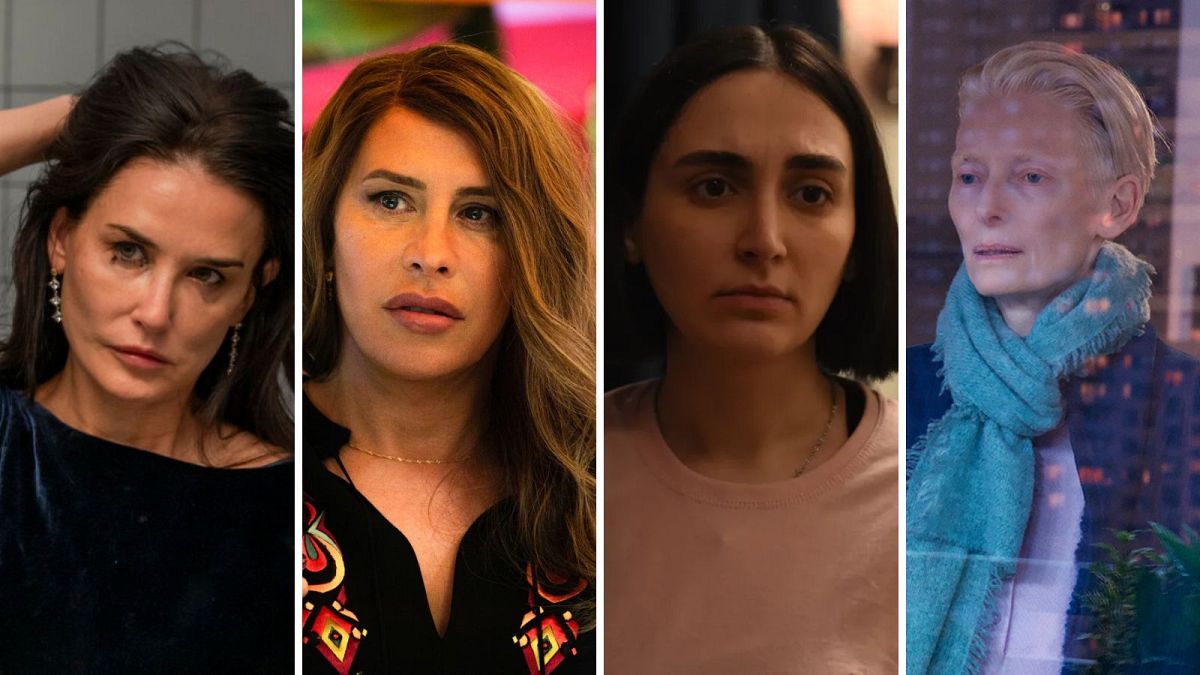
The European equivalent of the Oscars take place this weekend, and 'Emilia Pérez' by Jacques Audiard and this year’s Golden Lion winner 'The Room Next Door' by Pedro Almodóvar lead the nominations. Time for some predictions..
. The , which honour the greatest achievements in European cinema, are fast approaching. The ceremony takes place this coming weekend (Saturday 7 December) in the Swiss city of Lucerne and Euronews Culture will be on site to keep you abreast of all the results.

Like last year, we’re keen on getting our crystal balls out (yes, we have several – where were you when they were handing them out?) and , as Justine Triet’s took home...
Well, . It was a tidal wave which while merited, ended up sacrificing some diversity. Let’s hope that this year's laureates are a bit less one-note and the trophy joy is shared, as the EFAs are something of a bellwether for which EU titles are likely to be nominated in the upcoming US awards season.
.. And it’s always nice to get several titles involved.
Maybe that’s why, for the first time this year, films nominated for Best European Documentary and Best Animated Feature Film are also eligible in the Best European Film category. This means that the Best European Film nominations list for 2024 is larger than previous years, and includes titles like Mati Diop’s Golden Bear winner and Latvian Gints Zilbalodis’ superb animated film have made the cut. Check out the full list of nominees .
For our money, there are four entries that could feasibly take home the main prize. Double winner and French Oscar entry by Jacques Audiard and this year’s winner by Pedro Almodóvar lead the nominations, with both films nominated for Best European Film, Director and Screenplay, as well as Best Actress nods for in and in . We’re huge fans of here, a Mexico-set gangster trans musical featuring gender transitioning, cartels, gorgeous choreographies and songs about vaginoplasty.
It’s basically on Broadway, and it’s as unexpected as it is unmissable. In our review, we wrote: “Audiard manages to confidently balance the knowingly kitschy aspects of the musical genre (one number set in a clinic has “Rhinoplasty! Mammoplasty! Vaginoplasty!” as a chorus) with some touching character-driven moments, without forgetting to thrill you and address socially-charged hot-button topics along the way.” We also noted how Spanish transgender actress Karla Sofía Gascón is amazing and how there’s “power, pathos and earnestness seeping through every moment of Gascón’s performance, and the double-act she and Zoe Saldaña go on to form post-surgery is magnetic to watch.
” This film has a real shot at hoovering up the awards on the night. Read our . As for Pedro Almodóvar’s , it’s more of a mixed bag.
Based on Sigrid Nunez’s 2020 novel “What Are You Going Through”, the celebrated Spanish director’s first full-length English movie follows two friends who rekindle their friendship. It turns out that Martha (Tilda Swinton) has been diagnosed with terminal cervical cancer, and asks Ingrid (Julianne Moore) for a favour: to be in the titular room when she takes a euthanasia pill and ends her life with dignity. It fails to sit alongside , or as one of Almodóvar’s best.
However, it remains a touching tale of female friendship and death. As we noted in : “While the overly literal script and melodramatic flashbacks dilute some of the emotional authenticity at the start (perhaps something was lost in translation), the second half of the film becomes a fascinating exploration into the western world’s shortcomings when it comes to confronting death, and how humans tend to find "lots of ways to live life inside a tragedy".” So, definitely a contender and one which could send a message, as it is, beyond a humanist film, pro-euthanasia – and maybe .
Other frontrunners include Germany’s Oscar entry by exiled Iranian director , which has been nominated for Best Film, Director and Screenplay. This is one of our favourite films of the year, and considering what Rasoulof and screened at this year’s Cannes Film Festival, it would be fitting to reward his achievements. Set during the 2022 protests, centres on a family of four.
Patriarch Iman (Misagh Zare) has just earned a promotion after 20 years of loyal service as a civil servant. He will be an investigator, a role that comes with a pistol. The weapon is for protection, as he will be obtaining confessions and signing off death sentences for alleged dissidents.
When one of his daughters’ (Mahsa Rostami and Setareh Maleki) friend is hit with buckshot after a school raid, the rule-abiding household begins to unravel. The girls are ready to embrace the freedom they witness in social media videos of the protests, and by implicating their mother (Soheila Golestani), a rebellious germ starts to sprout. Things get even more tense when Iman’s gun disappears from his bedroom nightstand.
.. By following the story of these characters who double as cyphers of Iranian society, Rasoulof deftly escalates things from a claustrophobic domestic drama into a thrilling psychodrama with shades of horror.
In of this thriller-infused allegory, we noted: “It is a bold narrative trajectory that serves as a direct response to the wave of protests that erupted in Iran after the death of Masha Amini, with real phone footage censored by Iran’s government interspersed throughout the film. It is also a call to arms for those who refuse to accept control. Especially when that control is insidiously concealed as love.
(...
) We’re fortunate to have filmmakers who dare to challenge oppression, as well as film festivals that programme their work. The Seed of the Sacred Fig is an important outcry against tyranny and misogyny. And beyond the socio-political context of the film, Rasoulof has delivered a suspenseful film that boldly stands as one of this year’s very best.
” Indeed, like Maryam Moghaddam and Behtash Sanaeeha’s film , which premiered at this year’s , is a radical act of artistic defiance, and one that once more reveals that cinema can not only thrill, but educate and . It’s an artform that often requires creatives to put it all on the line so that voices aren’t silenced, and that’s just what Rasoulof and every member of his team, whether behind or in front of the camera, did. The fourth nominated film that we believe has a chance for Best European Film is Coralie Fargeat’s .
Should this demented, spine-cleaving triumph of a warped fairytale win, it’ll be one of the most out-there decisions and we’re here for it. For her second film, which won Best Screenplay in Cannes this year, French director Coralie Fargeat delivered a gory parable about the fetishisation of youth. It’s this year’s best and most hyped horror films, one which has divided audiences (we’re blaming weak stomachs) but one thing’s for sure: there’s no other film like it in 2024.
Essentially an unholy fusion of , “The Portrait of Dorian Gray” and , follows aging Hollywood actress-turned-workout host Elisabeth Sparkle (Demi Moore). She gets unceremoniously fired because slimeball TV exec Harvey (Dennis Quaid) wants a revamp. Faced with this sorry state of affairs, Elisabeth calls a number she’s been handed on a USB drive to join a mysterious program known as The Substance.
It promises to deliver "a better version of yourself” and in using the starting kit, Elisabeth gives birth to her younger self (Margaret Qualley), who emerges in a fleshy pouch from her spine. However, when the newbie fails to follow the rules of the programme, the consequences are not pleasant. In of the film, we said: “The Substance, addresses a familiar narrative: the fear of aging – specifically how Hollywood’s obsession with youth and beauty leads to the ruthless system discarding female talent the second they’re “past it”.
However, Fargeat executes it with a merciless precision that will have you squirming, wincing, gasping, laughing...
and squirming some more. (..
.) In showing how the entertainment industry pushes women to extremes in order to remain employable, Frageat explores society’s impossible beauty standards. More than that, she delves into how certain medical industries weaponize their fetishization of youth for profit, as well as the internalised hatred stemming from systemic misogyny.
It may not go particularly deep, but the savage form emphatically mirrors the content; the violence of disappearing in society’s eyes and the self-loathing that decries from this external trauma becoming internalised can only be expressed in an equally vicious way.” It’s a wild ride, which also features some quieter and powerfully relatable moments – including its best scene, in which a superb Demi Moore readies herself for a date in front of a mirror..
. If you haven’t already seen , get thee to a busy cinema (this is one you’ll want to experience with other cinemagoers, as the audience reactions will truly enhance the filmgoing) and “take care of yourselves.”.










